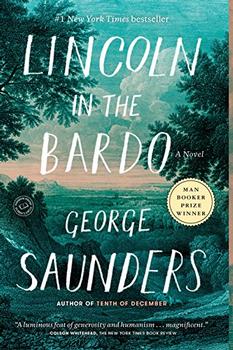Write your own review!
Rachel D Courtney
Brilliant, poignant, exceptional.
The writing style of George Saunders is unlike any other author I have ever read. His words sear, touch your heart like few things ever have. He has captured a beloved son's thoughts and a father's grief, completely. Highly recommend. Beautifully executed, unforgettable.
Lorri S
Life in Death
Just brilliant. I was skeptical at first because the structure of the novel is so unconventional (in the best way), but I believe the narrative carries you until you catch up and then you are just swept up. I was sobbing by the end. I will recommend it to everyone who will listen to me. George Saunders captures the hopefulness of life even in the face of its fragility and the inevitability of death. Saunders does not romanticize this, some of the characters are repellent but in a very human way. The narrative elicits some kind of primal empathy. For me, life changing.
 Cathryn Conroy
A Genre-Busting Novel That Is Daring, Peculiar, and Highly Imaginative. Read with Caution!
Cathryn Conroy
A Genre-Busting Novel That Is Daring, Peculiar, and Highly Imaginative. Read with Caution!
Well, this was, um, interesting. And by "interesting," I really mean bizarre, peculiar, and even rather rude and crude in parts. This Booker Prize-winning novel by George Saunders is not an ordinary novel. Read with caution.
The plot, such as it is, is relatively simple. Willy Lincoln, the 11-year-old son of President Abraham Lincoln and Mary Todd Lincoln, died on February 20, 1862 of typhoid fever. The president was so distraught and wracked with anguish that the night of Willy's burial he twice visited the crypt in which the little boy was interred in nearby Georgetown. That's all fact.
In this highly imaginative, albeit horrifying, novel, Willy's spirit goes to the bardo, a kind of purgatory, where he is visited twice by his grief-stricken father, who is also distressingly haunted by the enormous death toll of the Civil War. Even though that's the premise, in some ways it's all background noise to the fever-dream thoughts and ramblings of the bardo's other ghostly inhabitants, who mingle with each other, complain, criticize, and argue. (This is where it gets particularly weird.) It's these souls—a Protestant minister, a lust-filled printer, a murderer, a rape victim, a closeted gay man, a pickle manufacturer, a professor, several slaves, and many more—who themselves are striving to stay in this strange limbo but engage in a mammoth struggle over the soul of Willy Lincoln, helping him to move out of the bardo, which they deem is no place for a child. In so doing, they find a new kind of freedom for themselves.
In addition to the action in the bardo, many of the chapters deal with life on Earth—specifically the White House during the Civil War—before, during, and after Willy's untimely death, thus anchoring the novel to a specific time and place.
This novel has been described as "experimental," which is an apt term. It's more like a play than a novel. The narrative in the bardo is just a series of spoken sentences, some as short as a single word and some as long as two or three pages, by the inhabitants. The narrative in the White House is a series of quotes from letters, journals, newspaper articles, and books about the Lincolns. Some of these citations are real, others are fiction, and there is no easy way to tell the difference.
In Buddhism, the bardo is an in-between or liminal state between death and rebirth where the consciousness of the deceased can still understand words and prayers spoken on its behalf. The point of the novel seems to be focused on grief and loss, not only President Lincoln's grief for his son, but also—and especially—the grief the bardo's ghostly inhabitants feel for their own demise and what they have left behind.
This is a difficult book to read at first, but once I got into the flow of the narrative it became much easier. This is a daring, highly imaginative, and genre-busting book that will leave many readers confused but no doubt in awe of George Saunders's talent.
 Mal
Avant garde
Mal
Avant garde
I find myself in the minority. A little too avant garde for my taste, the style took away from the insurmountable grief LIncoln suffered. Hidden gems were few and far and I was needless to say disappointed. I enjoy Saunders immensely but not at all this time.
Labmom55
Not for me
I should have known. I really don't do well with the avant garde. I want a plot, I want a story. I want character development. This offers none of the above. I felt lost. Vague memories of Ionesco and Beckett kept cropping up as I tried to plough through this. The book alternates between reading like a thesis, full of quotes from “other” sources and then almost more like a play. Ghosts come and ghosts go. They each have their own little mini-story but there is little continuity. Some ghosts appear more often; Blevins and Vollman act as narrators, moving the meager story forward. The Rev. Thomas provides a glimpse of a sort of Revelations style individual reckoning. There are sections that are enticing or interesting. But they are small glimpses of jewels.
I am clearly in the minority here. All the wonderful reviews had me doubting myself. But in the long run, reading is all about pleasure. And this book brought me very little of that.
